“Arghhhh! Conflict. Conflict is hard. Conflict will ALWAYS hard. Hunker down and get used to feeling awful!!!”
I used to think that conflicts are bad and hard. Then I realized conflicts are only hard because I have conflict anxiety. Once I unlearned my conflict anxiety, conflicts became fun an interesting.
People who handle conflict well are magnetic. You trust them immediately. You can say anything to them without fear they’ll get triggered, avoidant, or secretly combust from suppressed anger three months later.
It’s wonderful. And you can be like this too!
When I became conflict-chill, something awesome happened: I got curious.
Instead of feeling “YOU’RE CROSSING MY BOUNDARIES,” I began to wonder: “Wait, what did they actually mean? Did I understand that as they intended?” Most conflicts are mistakes, so the first step should always be to ensure that we’ve understood the other correctly. But conflict anxiety blocks this natural curiosity.
How many dumb fights have you gotten into because of personal anxiety?
For me… a lot.
Many conflicts have little to do with ‘reality’, but mostly our own insecurities. After I unlearned my conflict anxiety, that simply stopped.
Instead, conflict feels like I’m there to investigate, a detective looking for clues, a researcher testing a hypothesis. Other people might still get triggered in my direction, but I don’t feel emotionally threatened anymore.
Conflict anxiety is there for a reason, of course. Locally optimal. Nonetheless, conflict anxiety can be skillfully relaxed.
After you unlearn your conflict anxiety, conflicts become interesting, and even beautiful. They become fun, riveting ways to learn about others. Like exploration: both of you can quickly hone in on your differences, and learn a lot quickly. Conflicts become a great way to make friends—fights become play.




Yeah https://en.wikipedia.org/wiki/Agonism
Surely there is a point after which it’s proven that these aren’t misunderstandings, and they really are willing to hurt you? Or at least deliberately intimidate you? Then do you get to be anxious without feeling like it’s your own fault?